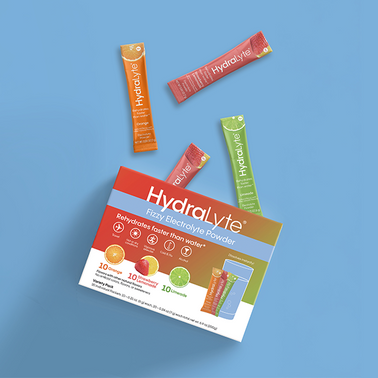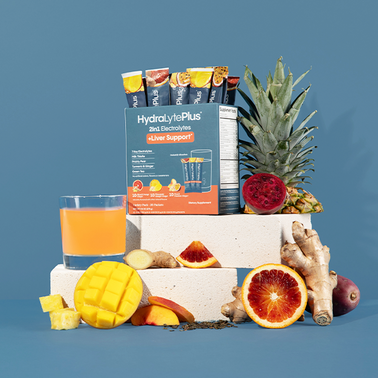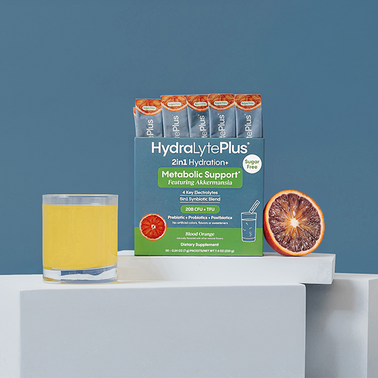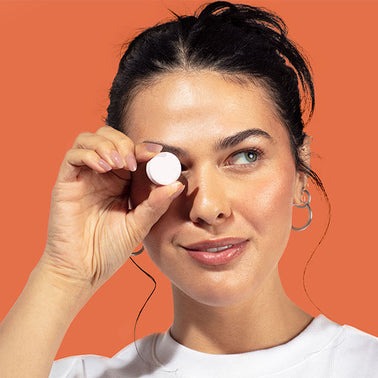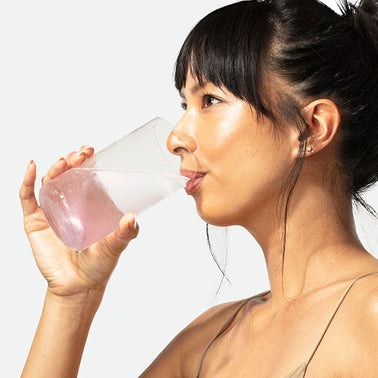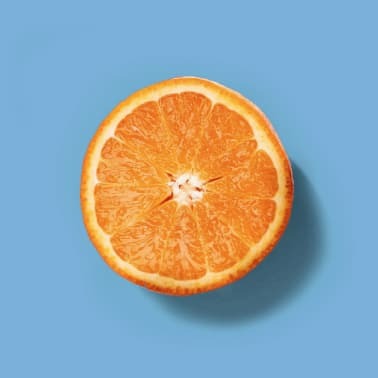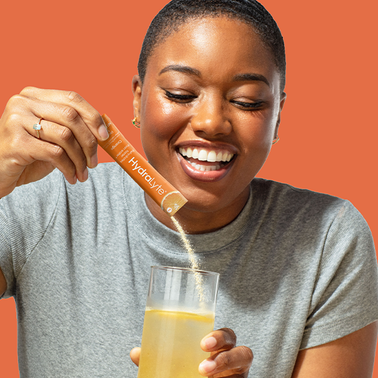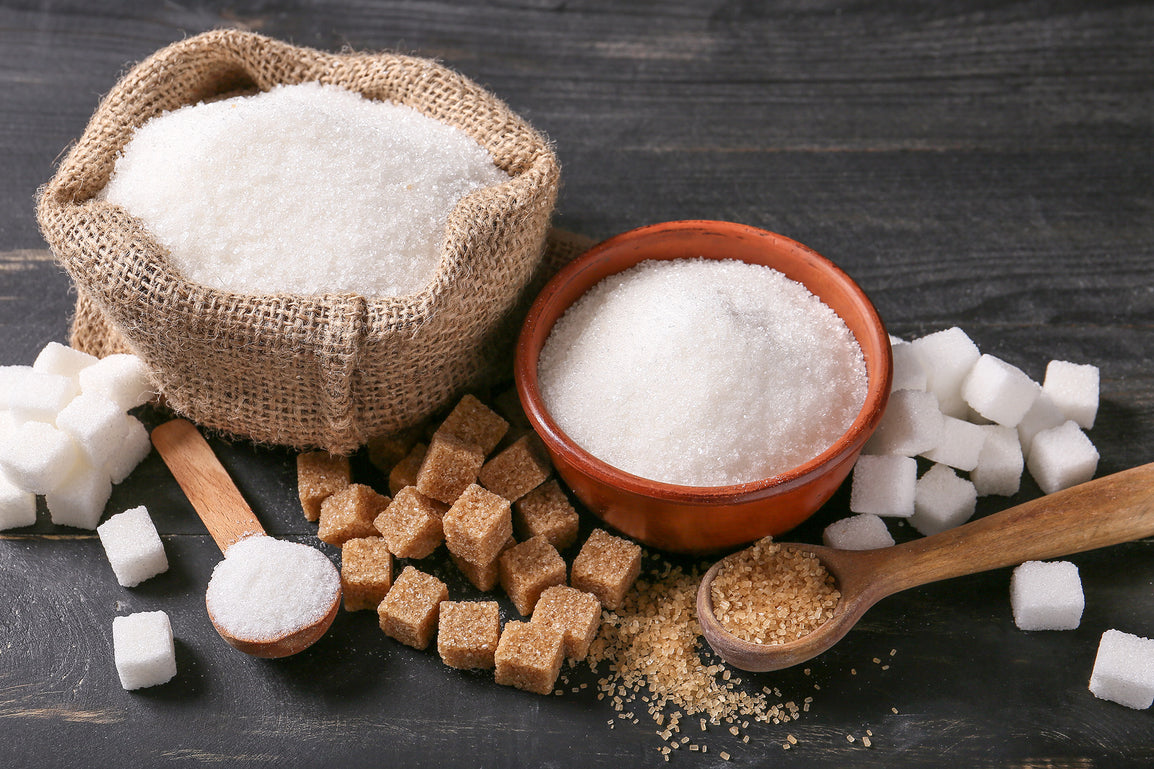By Wendy Bazilian, DrPH, MA, RDN
We love our sweets, but in the name of health, many of us are conscious of our daily sugar intake. And that’s a good thing. Our consumption of added sugars in the diet is well in excess of recommendations for overall health.
But you might be surprised to learn that sugar, in small amounts, actually plays an important role when it comes to hydration. And in fact, aside from adding flavor, there are circumstances when it can actually help! I’m not going to ‘sugar-coat’ this (I couldn’t resist), rather shed some light on this vital topic.
When it comes to rapid rehydration and replenishing electrolytes: Sugar matters. An optimal amount of sugar quite literally unlocks the doors of the intestinal barrier between your gut and your bloodstream to allow faster, more efficient rehydration when it really counts. An electrolyte drink will enter your bloodstream faster than water alone when it contains the correct balance of 3 things: sugar, electrolytes, and water. This crucial finding has led to rehydration approaches around the globe that have been estimated to save millions of lives from diseases that cause major dehydration and electrolyte loss. (1,2)] The truth is: Sugar considered is a key ingredient in any oral rehydration solution, and when present in the optimal proportions with electrolytes has been shown to be as effective as an IV drip. Surprised? Most people are!
Oral rehydration therapy was one of the great scientific discoveries of the 20th century and though a form of rehydration with electrolytes was developed and used since the 1940s, it wasn’t until 20 years later that scientists discovered that glucose – aka sugar – at the right level actually promoted the absorption and transportation of water, sodium and other electrolytes into the bloodstream quickly so the body could return to balance and reduce the likelihood of the effects of severe dehydration and even death.
Well for one – about 75% of us in the U.S. are dehydrated at any time.(3) That’s a lot! When you do look for ways to increase your hydration level, naturally water should still be your go-to, but when you’re in a situation where you are losing electrolytes and need to hydrate quickly—like when you have a cold or flu, traveling, after exercise, hot weather, among others—it’s important to choose a path to recovery with something that provides the correct formula to hydrate you quickly and help you feel better, faster. Water alone doesn’t replenish the lost electrolytes, which help the body retain fluid and are essential for nerve and muscle function.
There are a number of hydration products on the market, but many use more sugar than has been shown to be scientifically necessary for rapid rehydration—simply for flavor, not function. And we certainly do not need more than necessary when it comes to sugar. Other products use no sugar at all or use sugar substitutes for sweetness. Sugar-free products certainly do not meet the World Health Organization (WHO) guidelines for rapid rehydration which is based on scientific findings. (4) Too much sugar in a beverage and it may actually make dehydration (and also gut issues) worse. Too little sugar and you may not get the optimized shuttling effect of water and electrolytes into your bloodstream. This sounds a little bit like the fabled three bears and their porridge—too hot, too cold, just right.
There’s a ‘just right’ when it comes to sugar for effective hydration.
Hydralyte is scientifically formulated to meet the World Health Organization (WHO) formula for optimal rehydration with just the minimal-right amount of sugar (~3 grams per serving) to help speed electrolyte and water replenishment in a tasty, convenient, all-natural form, with no artificial colors.
Dehydration
Dehydration can be rough. Many of us slog on through moments of mental fogginess, bouts of fatigue, irritability, unexplained hunger or minor headaches that could actually be solved by staying hydrated.
As little as 1-3% dehydration can impact performance (cognitive and physical), mood, metabolism and more. As a result of warmer or drier climates, living in higher altitudes, active travel, aging and our busy lives – it’s really no surprise so many of us experience some of the effects of dehydration.
Dehydration affects:
- Cognitive performance:
- Physical performance
- Mood
- Thermoregulation, in other words, regulation of your body temperature to hover around 98.6 degrees Fahrenheit
- Leading to heat strain or heat stress or stroke
- If severe, can stress or harm heart, kidneys, other organs
A healthy immune system is also dependent on being hydrated. Underhydration can depress the immune system and also make it harder to fight off ‘offenders’ that may enter our systems—bacterial, viruses—or make illnesses last longer.
So how much?
Believe it or not, the actual recommendation is more than the outdated standard recommendation of 8 cups a day. The general recommendation from the National Academies of Science] is:
- For women, 11 cups per day
- For men, 13 cups per day (5,6)
My rule of thumb for hydration that will get you very close to your daily needs is to ‘half your weight in ounces’. This means that you divide your weight (pounds) by 2 and that’s how many ounces to aim for in your day.
If you weigh 150 pounds, drink 75 oz (or 9-1/3 cups) per day
150 / 2 = 75
Therefore: make it a goal to consume 75 ounces in mostly water and other smart hydrators like Hydralyte.
5 Tips to Help You Increase Your Hydration
Start your day with water.
Fill a bedside carafe or glass in the bathroom and make it a genuine part of your wellness wakeup routine to bathe your body and brain. That glass of water helps replenish fluid losses while you slept and will get your metabolism started.
If you’re hungry, first try water or Hydralyte.
Often, our bodies confuse thirst and hunger. The next time you feel hungry, check to see if you’re really just thirsty, and start to make water your go-to when you want to snack. Keeping in mind that a little sugar helps speed hydration, having hydration helpers like Hydralyte offer a tasty way to combat the false hunger and get you back in check.
Find a way to get to your goal by monitoring your intake.
Just like your favorite coffee mug, designate your go-to cup or water bottle. And choose a way to monitor your intake that works for you. Some people like to add up their daily ounces by refilling their glass throughout the day. And some individuals prefer counting down by emptying a full pitcher or water bottle. And there are many ways to track, too: On your phone, Bluetooth, apps, and good ol’ fashioned paper and pen.
If water feels just too ‘plain’, jazz it up with nutritious and natural hydration helpers.
Aim to make about half of your intake plain and sparkling (unsweetened) water and then get creative with other low sugar, but fun and flavorful, options that have some nutrition built-in:
- Add a splash of 100% juice to water
- Drink tea, coffee and milk in moderation
- Use Hydralyte electrolyte powder sticks: they’re all-natural, no artificial ingredients, contain far less sugar than other products, and are effective for all ages over 12 months*
- Enjoy vegetable drinks
- Fruit-infused drinks
Up to 20% of your water can come through foods. I call this eating your water, and it’s yet another reason to up the vegetables and fruits in your day—which are 70-95% water. Have a vegetable and/or fruit at every meal and most snacks. And try to incorporate a soup or salad or better yet, a soup and salad most every day.
Remember that hydration is critical to your health and a little sugar in one’s rehydration routine has been scientifically shown to be necessary—at low levels—to make hydration more efficient and effective.
Cheers to your health and drink well!
 |
Wendy Bazilian, DrPH, MA, RDN is a registered dietitian and American College of Sports Medicine-Certified Exercise Physiologist. She is an award-winning journalist and author and co-author of several books including a New York Times Bestseller. Wendy is in private practice and works with personal clients ranging from CEOs, artists, and actors, to professional athletes, parents and children seeking to improve their and their family’s nutrition, fitness and health. Wendy is an expert consultant to the spa industry, to start-up and established food and commodity groups, and to the healthcare industry. A frequent nutrition and wellness keynote presenter at scientific, medical, corporate, culinary and public conferences and festivals. She is the Nutrition Expert and frequent guest on LIVE with Kelly and Ryan and as a freelance writer has written for Business Insider, The Guardian, Prevention, Martha Stewart Living and other media. Wendy lives in San Diego with her husband and daughter. |
|---|
* Hydralyte is safe for children over 1 year of age for dehydration or sickness, but always consult your child’s pediatrician for advice on the recommended use and timing of any rehydration product or beverages other than water, milk, or fortified, unsweetened soy milk.
References
1. Control of diarrhoeal diseases: WHO's programme takes shape, WHO Chronicle, 1978, 32 (10): 369-72, 369.
2. Magic Bullet: The History of Oral Rehydration Therapy. (1994)., Medical History, 1994, 38: 363-397. Accessed February 14, 2022:
https://rehydrate.org/ors/pdf/history-of-ort.pdf
3. Kenney et al, Prevalence of Hydration among US Children and Disparities by Gender and Race/Ethnicity, AJPH, 2015.
4. World Health Organization, Oral Rehydration Salts: Production of the new ORS, 2006. Accessed February 14, 2022:
https://apps.who.int/iris/bitstream/handle/10665/69227/WHO_FCH_CAH_06.1.pdf;sequence=1
5. IOM, Dietary Reference Intakes for Water, Potassium, Sodium, Chloride & Sulfate Summary, 2005. Accessed February 14, 2022:
https://www.nationalacademies.org/news/2004/02/report-sets-dietary-intake-levels-for-water-salt-and-potassium-to-maintain-health-and-reduce-chronic-disease-risk
6. IOM, Dietary Reference Intakes for Water, Potassium, Sodium, Chloride & Sulfate, 2005. (Full report). Accessed February 14, 2022:
https://books.nap.edu/catalog/10925/dietary-reference-intakes-for-water-potassium-sodium-chloride-and-sulfate?onpi_newsdoc021104=

